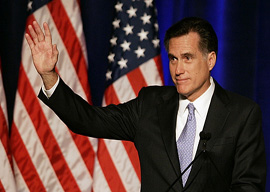
June 06, 2011

Mitt Romney
It’s some time since I read Plato’s Dialogues, but I recall Socrates saying that it was possible to judge a candidate’s worthiness for office by the determination with which he resisted it. The wisest thing William Tecumseh Sherman ever said was, “I will not accept if nominated and will not serve if elected.” If he had not been the butcher of Georgia and murderer of America’s indigenous population, that statement alone should have qualified him. Instead, the Republicans that year (1884) nominated the great statesman James Blaine. Remember him? He lost to Grover Cleveland.
America’s commercial form of democracy was endorsed by a Supreme Court decision last year that assured big capital’s right to choose our nominees. The 5-4 verdict in Citizens United v. Federal Election Commission does for the republic what the Dred Scott decision achieved for the Union. This system of funding candidates does not allow good people to come forward. It encourages the opposite. It enables politicians who agree to anything to get into office—whether through appointing unethical financiers to oversee the economy; granting government contracts to companies whose corrupt practices and shoddy products would send their managers to the penitentiary in a sane society; guaranteeing AIPAC twenty-four-hour access to the Oval Room and billions of dollars for Israeli settlers to do to the Palestinians what Sherman did to the Indians; and paying the taxpayers’ annual tribute in gold to weapons-makers. Candidates agree to do all this harm merely to put their names at the bottom of that illustrious list of placemen that includes Millard Fillmore, Warren G. Harding, and Bill Clinton.
Corruption and mediocrity, as Tocqueville noted, always lurked within popular democracy. Placating the mob was unlikely to achieve excellence. Plato batted around the contradiction between popular government and good government, coming down—as both Karl Popper and I. F. Stone wrote—hard against democracy. As most people forget, the word “democracy” derives from two words whose Greek origins mean “mob” and “rule.”
No one was more aware of this than British parliamentarian and historian Thomas Babington Macaulay, who helped extend the franchise to the very mob to whom he refused to pander. As a Whig Member of Parliament, he fought hard for the Reform Law of 1832 that opened the way to universal male suffrage. The electors of Leeds then asked him to represent them in the next elections. He wrote to one of them in August 1832:
The practice of begging for votes is, as it seems to me, absurd, pernicious, and altogether at variance with the true principles of representative government….The practice of canvassing is quite reasonable under a system in which men are sent to Parliament to serve themselves. It is the height of absurdity under a system under which men are sent to Parliament to serve the public. While we had only a mock representation, it was natural enough that this practice should be carried to a great extent. I trust it will soon perish with the abuses from which it sprung.
Alas, the practices of sending men to Parliament, as well as the House of Representatives and the Senate, to serve themselves and their financial benefactors did not perish. If such practices do not vanish soon, democracy will.